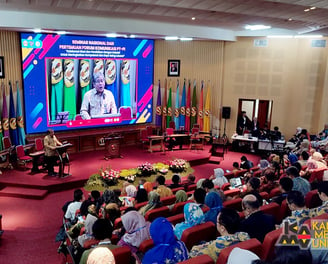Facilitate Global Collaboration
The seminar aims to provide a dynamic platform for global collaboration, bringing together experts, researchers, practitioners, policymakers, and industry leaders from diverse backgrounds and regions.
The seminar seeks to facilitate the exchange of cutting-edge knowledge and best practices in sustainable weed control, drawing upon the expertise of participants from academia, industry, and the agricultural sector.
Through presentations, workshops, and interactive sessions, the seminar will showcase innovative approaches and technologies for sustainable weed management, highlighting practical solutions that address the challenges facing modern agriculture.
International Seminar of Weed Science
Welcome to the official website of the International Seminar of the Weed Science Society of Indonesia 2025, your one-stop resource for all seminar-related information.
Discuss Latest Research Findings
The seminar will serve as a forum for discussing the latest research findings and insights into weed biology, ecology, and management, providing a platform for researchers to disseminate their work and engage in fruitful discussions with peers.
In addition to formal sessions, the seminar will provide ample opportunities for networking and collaboration, enabling participants to forge new connections, share experiences, and explore potential partnerships for future research and development initiatives.
Promote Networking and Collaboration
Advance Policy Discourse
The seminar seeks to empower stakeholders across the agricultural value chain with the knowledge, tools, and networks needed to implement effective and sustainable weed control strategies, contributing to enhanced agricultural productivity, environmental stewardship, and food security on a global scale.
Empower Stakeholders
By bringing together policymakers and thought leaders, the seminar aims to advance policy discourse on sustainable weed control, fostering dialogue on regulatory frameworks, incentives, and strategies to promote the adoption of environmentally friendly weed management practices.
Exchange Cutting-Edge Knowledge
Showcase Innovative Approaches


Explore holistic approaches to weed management, incorporating cultural, mechanical, biological, and chemical control methods to optimize effectiveness while minimizing environmental impact.
Integrated Weed Management (IWM)




Aquatic Weed Control
Precision Weed Management Technologies
Aquatic weed control is essential for maintaining healthy water bodies, whether for agricultural, recreational, or environmental purposes. Chemical control methods that have no environmental side effects to living creatures in water such as fish are required.
Delve into cutting-edge technologies, including remote sensing, GPS-guided machinery, and autonomous systems, for precise and targeted weed control, optimizing and enhancing resource efficiency.
Topics to be Covered
Agroecological Approaches to Weed Control & Climate Change and its Impact on Weed Dynamics


Explores the use of agroecological principles, such as intercropping, crop diversification, and habitat manipulation to naturally suppress weeds, boost biodiversity, and improve soil health. Additionally, the topic assesses the influence of climate change on weed growth patterns, competition, and distribution, and how to adapt weed management strategies in response to these changes.


Weed Resistance Management
Focuses on understanding the development of herbicide-resistant weed populations, identifying the mechanisms of resistance, and exploring strategies to mitigate resistance through rotational use of herbicides, diversification of control methods, and adopting resistance management practices.


Edible Weed & Allelopathy
Cover a range of related issues, including agronomy practices that influence weed growth, pesticide regulation and safety, and soil health's impact on weed ecology. It will explore the socio-economic aspects of weed management, such as cost-effectiveness, labor demands, and farmers' adoption of new technologies. Additionally, this section will address government policies, extension services, traditional and cultural weed control methods, and their integration with modern practices to create sustainable, region-specific strategies.
Examines the potential use of certain weeds as edible resources and their nutritional value. This topic also includes discussions on allelopathy, where certain plants or weeds release chemicals that inhibit the growth of other species, and how this knowledge can be harnessed in weed management.


Miscellaneous
Benefits of Participations


Access to Advanced Research
Networking Opportunities
Exposure and Recognition
Knowledge Exchange and Capacity Building
Inspiration and Innovation
Contribution to Global Food Security
Publications
The 2024 International seminar serves as a premier platform for the dissemination of cutting-edge research and advancements in theoretical and experimental weed sciences, as well as sustainable agriculture practices. Drawing together esteemed researchers, academics, scientists, and industry leaders from across the Asia Pacific region, the seminar provides a fertile ground for the exchange of ideas and the exploration of innovative solutions to pressing agricultural challenges.
We invite paper submissions encompassing both abstracts and full papers on a wide range of topics, including but not limited to:
Integrated Weed Management (IWM)
Aquatic Weed Control
Chemical Weed Control Methods
Biological Control Methods & Organic Farming Practices for Weed Suppression
Precision Weed Management Technologies
Agroecological Approaches to Weed Control & Climate Change and its Impact on Weed Dynamics
Weed Resistance Management
Edible Weed and Allelopathy
Miscellaneous
Accepted abstracts will be included in the seminar materials distributed to all participants, providing authors with valuable exposure and recognition. Authors are strongly encouraged to submit full papers for publication in reputable international journals affiliated with the seminar. These journals are indexed in prestigious indexing systems, ensuring broad visibility and scholarly impact.
Currently, our committee is in close communication with several esteemed journals, some of which have already committed to publishing articles from the seminar. These include:
Kultivasi (SINTA 2), Publisher: Universitas Padjadjaran Press
Agrikultura (SINTA 2), Publisher: Universitas Padjadjaran Press
Authors should note that the article processing charge of the selected journals is the responsibility of the authors. However, publication in these reputable journals offers unparalleled opportunities for visibility, dissemination, and scholarly recognition.






